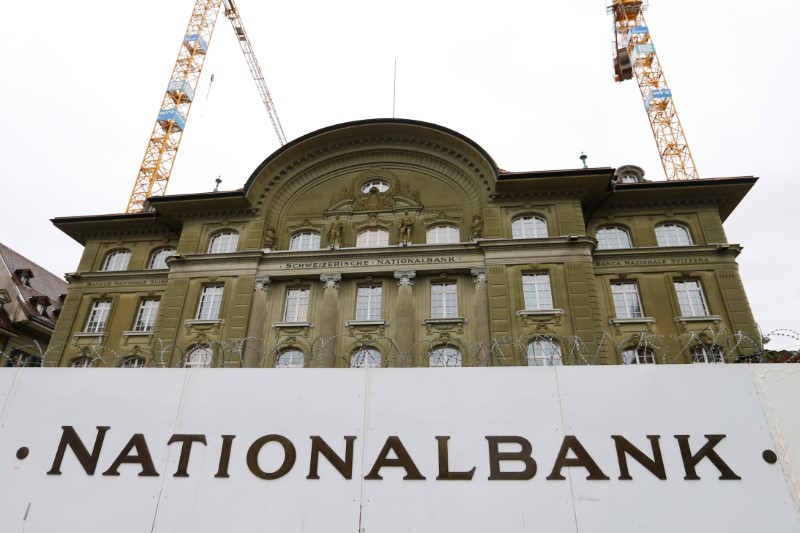 © Reuters. Swiss National Bank (SNB) building is seen in Bern
© Reuters. Swiss National Bank (SNB) building is seen in BernZURICH (Reuters) – The Swiss National Bank will keep its foot on the monetary gas, Chairman Thomas Jordan said on Friday, warning that premature tightening of policy would risk undoing years of work to rein in the strong Swiss franc and support the export-led economy.
His remarks prepared for the SNB’s annual general meeting in Bern underscored its commitment to keep policy loose while other central banks start to normalize their stances as the impact of the global financial crisis waned and the global economy strengthened.
Jordan noted that the Swiss economy picked up as well last year, with capacity utilization up and unemployment down. Fourth-quarter economic growth hit 1.9 percent year-on-year, while inflation turned positive for the first time since 2011.
The franc’s weakening against the euro since the second half of last year has boosted price competitiveness of exporters and “provided welcome relief for the Swiss economy”, he said.
Still, the franc’s trade-weighted real external value is now around the same level as before the SNB scrapped its exchange rate floor for the franc to the euro in January 2015.
“There has thus been a reduction in the significant overvaluation, but our currency nevertheless remains
highly valued,” he said, using the SNB’s standard description of the franc’s strength.
The SNB continues to pursue an expansionary monetary policy based on the negative interest rate it charges on sight deposits at the central bank and on “our continued willingness to intervene in the foreign exchange market as necessary”, he said.
“Both instruments remain essential as the situation is still fragile. While the foreign exchange market has largely shrugged off recent equity market turbulence, circumstances in the
financial markets – and thus by extension monetary conditions for the economy – could rapidly deteriorate again,” he said, calling such a development “undesirable in the current environment”.
Jordan said inflation was now within the range that the SNB equates with price stability, and capacity utilization has continued to improve.
“Nevertheless, inflation remains low and inflationary pressure is modest despite our expansionary monetary policy. Tightening monetary conditions would be premature at this juncture, and would risk unnecessarily jeopardizing the positive economic momentum that has been established.”
The Swiss franc has weakened more than 2 percent versus the euro () since the start of 2018, last week breaching the 1.20 francs to the euro level defended by the SNB for three years until January 2015.
The weakening has been welcomed by Swiss manufacturers, whose profitability was severely hit by the rising franc.
Fusion Media or anyone involved with Fusion Media will not accept any liability for loss or damage as a result of reliance on the information including data, quotes, charts and buy/sell signals contained within this website. Please be fully informed regarding the risks and costs associated with trading the financial markets, it is one of the riskiest investment forms possible.
Source: Investing.com



























